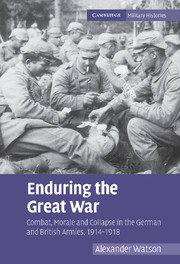Book contents
- Frontmatter
- Contents
- List of plates
- List of figures
- List of tables
- Acknowledgements
- List of abbreviations
- Map: The Western Front 1914–1918
- Introduction
- 1 War of endurance
- 2 Why men fought: combat motivation in the trenches
- 3 Self-deception and survival: mental coping strategies
- 4 Junior leadership: command, cohesion and combat motivation
- 5 Morale and military endurance
- 6 The German collapse in 1918: strike, mutiny or an ordered surrender?
- Conclusion
- Appendix 1 Walter Ludwig's study of Württemberg soldiers' coping strategies
- Appendix 2 Psychiatric casualties in the German and British armies
- Appendix 3 Military ranks and status in the German and British armies
- Glossary of German terms
- Bibliography
- Index
Appendix 2 - Psychiatric casualties in the German and British armies
Published online by Cambridge University Press: 05 February 2014
- Frontmatter
- Contents
- List of plates
- List of figures
- List of tables
- Acknowledgements
- List of abbreviations
- Map: The Western Front 1914–1918
- Introduction
- 1 War of endurance
- 2 Why men fought: combat motivation in the trenches
- 3 Self-deception and survival: mental coping strategies
- 4 Junior leadership: command, cohesion and combat motivation
- 5 Morale and military endurance
- 6 The German collapse in 1918: strike, mutiny or an ordered surrender?
- Conclusion
- Appendix 1 Walter Ludwig's study of Württemberg soldiers' coping strategies
- Appendix 2 Psychiatric casualties in the German and British armies
- Appendix 3 Military ranks and status in the German and British armies
- Glossary of German terms
- Bibliography
- Index
Summary
Any estimation of the psychiatric casualties suffered by the German and British armies during the First World War is fraught with difficulty due to contemporaries' categorisation and treatment of patients. Particularly in Britain, although also elsewhere, the dominant view within the medical profession before 1914 was that most mental disease had organic origins. Psychiatric illness was believed to be hereditary and caused by minute lesions in the brain. No intermediate state between sanity and insanity was recognised by English law. When men began to suffer mental collapse in the trenches, doctors were thus poorly equipped to recognise and treat the psychological root of their problems. In 1914, the somatic symptoms displayed by many men were confusing and invited misdiagnosis. Some diseases resembling organic ailments continued to baffle doctors throughout the war. Functional cardiac disorders such as ‘Disordered Action of the Heart’ and ‘Valvular Disease of the Heart’ particularly concerned British medical authorities. The German army was inflicted by a rash of digestive nervous disorders at Verdun in 1916. On both sides in the last years of the war psychiatric patients were often misdiagnosed as gas casualties: after examining men allegedly suffering from mustard gas poisoning in 1918, Lord Moran argued that in most, ‘the organic lesions were negligible or absent, it was the mind that had suffered hurt’. The result of this confusion was that, as one psychiatrist observed, ‘the true proportion which neurosis bore to the total medical casualties of the War was vastly underestimated in official statistics’.
- Type
- Chapter
- Information
- Enduring the Great WarCombat, Morale and Collapse in the German and British Armies, 1914–1918, pp. 238 - 240Publisher: Cambridge University PressPrint publication year: 2008



